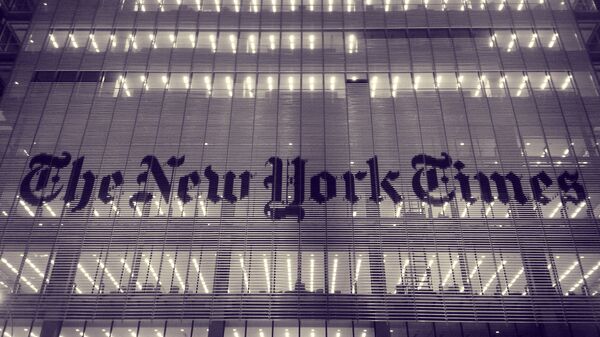Both the Times and the Post stories rolled out shortly after Facebook announced its ban on the accounts in a blog post, but quotes directly from the horse's' mouth in the Times and the publication of screenshots of pages that were deleted at the time of Facebook's public announcement raise questions over whether there was coordination between the social media giant and the two most prominent liberal newspapers in the United States.
In the New York Times article, Facebook's ban is sometimes referenced in the future tense and sometimes in the past. For example, one bit reads, "The company said it would remove the pages and accounts," while another says, "Mr. Gleicher said that the accounts and pages that Facebook took down on Thursday violated its rules… "
— Alex Rubinstein (@RealAlexRubi) October 12, 2018
That Mr. Gleicher is Nathaniel Gleicher, Facebook's head of cybersecurity policy — who not only authored Facebook's statement about the ban but also spoke privately with the Times at length.
The Times cited by name a few of the banned pages but did not say how it learned that those specific pages had been shut down. The Washington Post said that Facebook named five pages it had banned in its statement; however, no such information exists in the statement.
— Ford Fischer (@FordFischer) October 12, 2018
Both of the legacy papers also published screenshots of some of the banned pages. It isn't clear how the companies obtained them, however, as the pages were banned before Facebook made its announcement and thus were no longer viewable by the public. Facebook may have told the outlets of the upcoming ban or provided them with a selection of screenshots.
Either way, the examples cited are not really representative of the largest pages that were purged. The cover images on both outlets' reports show posts that are right-wing and inflammatory. The Post's cover image features a post by "Nation In Distress" which asks whether Democratic Congresswoman Maxine Waters (D-CA) is "demented?" That article was originally uploaded to a website called "Right Wing Tribune."
The Times' cover image features a post by "Right Wing News."
— Lee Camp [Redacted] (@LeeCamp) October 12, 2018
While there are brief mentions in the Times' story of banned left-wing pages with notable influence, such as Reverb Press and The Resistance, the only pages to have screenshots of their posts published were right-wing. Those posts covered topics ranging from support for US President Donald Trump and his Supreme Court nominee Brett Kavanaugh, who has been accused of sexual assault, to anti-Muslim arguments.
Facebook made it clear that it wasn't banning the pages for their political positions but because of some form of "inauthentic behavior."
While Facebook's latest round of bans targeted a spectrum of politicized American pages, its overall portrayal in the mainstream press as a purge of the right wing is a dramatic departure from reality. Sputnik News independently uncovered a number of far more credible, left and libertarian-leaning news websites with far more influence and reach that were shut down and completely ignored in the liberal papers' writeups.
— JamesFromTheInternet (@JamesFTInternet) October 12, 2018
The Post — to its credit — wrote a more balanced story than the Gray Lady, though both tried to link the behavior allegedly displayed by bad American actors to Russia, arguing, in essence, that inauthentic use of social media is not uniquely Russian, but Russian in character.
If you ask the Post, "false information" posted by foreigners is "clear-cut manipulation," but if posted by Americans, it "could be considered free speech."
It's a reassuring display of nuance from a paper which proudly proclaims that "Democracy dies in darkness."
"These networks are trying to manipulate people by manufacturing consensus — that's crossing the line over free speech," Ryan Fox, co-founder of New Knowledge, told The Times. New Knowledge is a venture capital-funded cybersecurity firm.
— Rachel Blevins (@RachBlevins) October 12, 2018
But were these pages really trying to manufacture consensus, or are the mainstream media and Silicon Valley projecting? When it comes to coverage of international issues — say Iran, Russia, Syria or Venezuela — who manufactures consensus more demonstrably than CNN, MSNBC, Fox News, The New York Times and the Washington Post?
"Multiple full-scale invasions of Syria have been prevented because of information that the alternative media made viral," John Vibes, a reporter for one of the banned media outlets, The Free Thought Project, told Sputnik News on Thursday. With these pages that commanded such massive reach now deleted, perhaps it will be that much easier to manufacture consensus for war.
Some have pointed out that websites like The Anti-Media and The Free Thought Project are competitors to the New York Times and the Washington Post, and there has been a remarkable absence of outcry over them being silenced. For all the bloviating about a free press in the Trump era, it appears that mainstream journalists are all too happy to have the pages removed, and their personal legitimacy therefore reaffirmed and bolstered.
— Robbie Martin (@FluorescentGrey) October 12, 2018
While the pages that were banned may have sometimes gotten it wrong, the New York Times and the Post do too. Even in its reporting on this story, the Times quoted Molly McKew as an "information warfare expert," despite the fact that she has no real credentials on the topic and is a registered foreign lobbyist — which the Times failed to disclose.
While the Anti-Media, for example, did not typically post much about electoral politics, Facebook departed from its norm in explicitly mentioning the midterm elections in announcing the latest ban. "This could be an attempt by Facebook itself to affect the outcome of the coming elections," Anti-Media founder Nicholas Bernabe told Sputnik.
Meanwhile, the Times referred back to a previous purge from Facebook: a late July ban on some 30-plus pages and accounts displaying allegedly inauthentic behavior. The outlet claimed that Facebook noted the proximity in time of that ban to the midterm elections. However, Facebook never did. In fact, Facebook specifically said they banned the pages because of "what we know today given the connection between these bad actors and protests that are planned in Washington next week," referring to the Unite the Right 2.0 protest in Washington, DC, on August 12.
Neither the New York Times nor the Washington Post responded to requests for comment in time for this article's publication.





